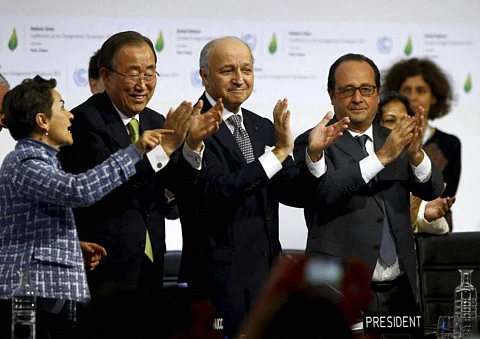Following the climate conference (COP21) in Paris, it appears to be an euphoria amongst the 120 participating nations as if the climate crisis has been sorted out once and for all and in one stroke.
A careful reading of the pact would make one realise that what has been achieved was to agree on a target of adopting the goal of keeping global temperature rise to under two degrees, followed by discussions on financing of developing economies to help make the transaction. The agreement, which is scheduled to go into effect from 2020 is only a system of voluntary pledges made by individual countries to limit their greenhouse emissions.
The Paris Pact requires developed countries to raise finances of $100 billion per year as floor level by 2020 to help the developing countries in their mitigation activities. There are also a series of deadlines for review and discussions. Beyond this, nothing has really happened in terms of practical purposes.
It is conspicuous that the impediments in achieving the target have not been discussed. There are still considerable differences of opinion as to which countries contribute more to global warming and also a definite view of a few developed countries that some of the highly populous developing countries with unchecked population growth can be a stumbling block for achieving the target.
It has been vaguely said that the substitution of the use of fossil fuels by renewable energy can be a game changer, but there is no indication how this would be achieved on a global scale to the level of the need. The world is still largely dependent on the use of coal, natural gas and crude oil for it’s energy needs and feedstock requirements. However, no one seems to have thought of stressing the need for providing a time bound target for the reduction of fossil fuels, which would considerably affect the economy of several countries.
There has been a lot of congratulatory noise from the developing countries and developed countries on raising funds to help the developing countries. This “strategy” appears to have pleased the developing countries as if they won the battle and the developed countries as if they have done their duty to check climate change. But, this “strategy“ cannot be a substitute for developing a proper strategy on the technology front, which is a real challenge.
While it is a fact that in a conference of a few days such strategies cannot be evolved to meet the challenge, it would have been appropriate if the climate pact made a reference to the challenges ahead, rather than thinking that fixing a target is achieving it.
— The reader is an Indian founder trustee of an NGO based in Chennai, India
Sign up for the Daily Briefing
Get the latest news and updates straight to your inbox
Network Links
GN StoreDownload our app
© Al Nisr Publishing LLC 2026. All rights reserved.
